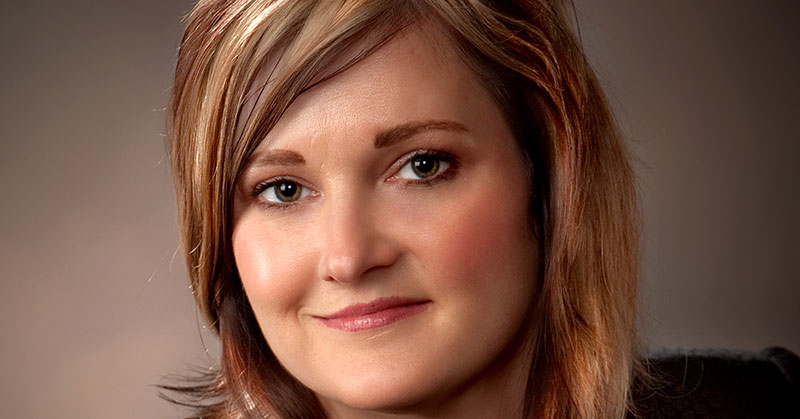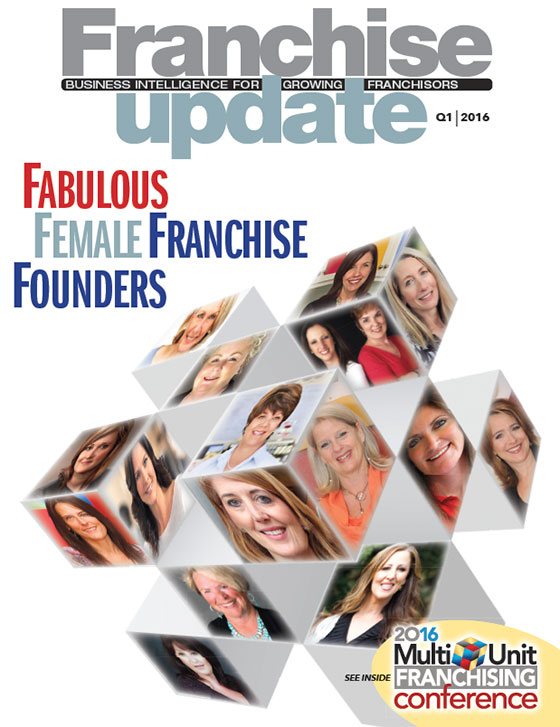Founded in Love: Necessity was the Grandmother of This Brand

Shelly Sun, co-founder of BrightStar Care, never planned to start a company. But in 2001, she and her husband, J.D. Sun, were struggling to find quality in-home care for his grandmother and discovered they weren't alone. Soon after, they decided to take matters into their own hands.
"We built a healthcare staffing company to provide the full continuum of care, from home care to supplemental staffing for corporate clients such as nursing homes and physicians," she says. Sun says she worked 90 to 100 hours, 7 days a week in those early years, but the payoff has been worth it.
They launched the company in 2002 and began franchising in 2005. "Although we already had three successful company-owned locations, we knew that through franchising we would be able to expand much faster than if we were to do it on our own," she says. BrightStar Care was the first franchising company in the U.S. to specialize in both medical and non-medical care and healthcare staffing.
Now a decade later, BrightStar has grown to more than 300 locations nationwide serving more than 15,000 families and generating more than $350 million in system-wide revenue. The brand offers a full continuum of caregiving in the home, including adult, elder, and child care, along with babysitter and nanny services. And Sun says there's much more to come, including a new, complementary brand.
"I'm excited about the start-up phase of our second brand, BrightStar Senior Living and Memory Care, and the international expansion of BrightStar Care in 2016," she says.
Name: Shelly Sun
Title: CEO, co-founder
Company: BrightStar Care
System-wide revenue: $350 million
No. of units: 309
International units: 0
Growth plans: By 2018, we plan to have 3 brands and be operating in at least 8 international markets. In the next 10 years, I predict that BrightStar Care will be serving 250,000 families and will have grown in revenue to $3 billion.
Public or private? Private
Year company founded: 2002
Year started franchising: 2005
Your years in franchising: 11
Getting Started
What inspired you to start your business?
In late 2001, my husband J.D.'s grandmother was in need of quality in-home healthcare. Through our personal journey, we identified a gaping hole in the healthcare sector, and we saw firsthand the need for a better in-home care option. In early 2002, my husband's grandmother passed away. Shortly after her death, we were given the book Rich Dad Poor Dad as a gift. The book relays a message for its readers to take control of their own destiny. We took this as a serious sign to start our own business that would offer families a service we were once desperate for, a service that was not being provided anywhere else. From there, J.D. and I founded BrightStar Care in late 2002.
What is your background? How did it prepare you for starting your business?
I hold a B.S. in accounting from the University of Tennessee and an M.S. in accounting from the University of Colorado. Before BrightStar, I held executive positions in the airline, insurance, distribution, and technology industries. The common theme is that I was often tasked with leading large teams and have frequently moved from accounting roles into operations when the needs of the business called for it. I enjoy leading and inspiring teams to reach higher levels of performance and helping individuals reach their potential. I have a strong financial acumen and am able to manage the results and personnel to a critical set of metrics. My background with numbers, leadership, team development, and organizational planning were a critical foundation to succeed as an entrepreneur and to access capital along the way to expand as opportunities arose.
What's the best and worst advice you got when starting out?
Best: Establish an advisory board to assist me in my entrepreneurial journey. I was encouraged to have other founders on the board along with franchise experts. This advice has proven invaluable. My advisory board has evolved three times at different stages of the business's life cycle. On my current board, I feel blessed to have tapped into the talent of David Barr and Sid Feltenstein as we tackle uncharted territory with international expansion, debt recapitalization, national TV advertising, and many more exciting opportunities for growth.
Worst: That it would take only $100,000 to launch our franchise initiative. Since I am a CPA by background and conservative, I planned for a cushion and ensured we had $250,000 to invest in launching our franchise opportunity. We needed nearly $500,000 to get our franchising organization to be self-sufficient where recurring revenues were more than expenses.
Why did you choose franchising?
In our original business plan we would expand to have hundreds of locations across the country. In that original plan, we didn't know if we would raise money and have all locations be company-owned, if we would enter into joint venture partnerships to share the investment/risk with local operators, or if we would franchise. As franchisees ourselves (Choice Hotels in 2004), seeing the hotel franchise model up close made the path of franchising crystal clear.
How did you get started in franchising?
My mother-in-law invested in two hotels in mid-2004 and invited us to invest as well. I attended the franchise's new owner and new manager training with her and came away from the training classes with the idea that BrightStar Care could work as a franchise, expanding much more quickly than if we were to open locations on our own. After successfully opening a second and third location in McHenry and Chicago, we knew we had a business model that could be successfully replicated and that we had the systems to open and grow a location to help others do the same. We sold our first franchise location in late 2005.
Did you have a partner/co-founder when you started? How important was that in building your company?
My husband J.D. and I co-founded BrightStar Care together (see above). J.D. was strong at sales and handled that function. I handled the recruiting, customer service, operations, and finance functions and built the organization to handle the scale as the business grew. It was a great partnership. Eventually we backfilled our old roles, and I went on to start and run the franchise company with J.D. handling franchise sales at different points in our life cycle until we hired an industry veteran to build out an entire franchise development team.
How did you fund your company at the beginning? As you grew?
In the beginning I used the majority of my severance package from United Airlines to launch BrightStar Care and coupled that with a bank line of credit to fund accounts receivable. As the company grew, we were fortunate to be approved for State of Illinois Department of Commerce loans set aside for female-owned businesses.
What were the keys to funding your brand?
In the beginning with company-owned stores, the keys to funding were sufficient working capital lines of credit to cover the growth in accounts receivable as sales ramped up. As we expanded into franchising, we used profits from company-owned operations, but we also needed loans and lines of credit to assist with the costs incurred ahead of when revenues were earned. We leveraged state programs created to assist female-owned businesses to access the capital we needed to launch the franchise brand and again to further its growth.
Building The Business
What has been the best and the hardest thing about being an entrepreneur?
Best: The opportunity to help others become entrepreneurs through our franchisees and other emerging franchisors I mentor. It is such an incredible honor to work alongside passionate, driven franchisees who serve customers and create jobs in their communities. I may be a little biased, but I believe we have the best franchisees of any system. It is always an amazing experience to open the awards ceremony at our Annual Conference Gala and look at a roomful of more than 250 people who have become dear friends and achieved great success and remember that just 10 years ago none of it existed.
Hardest: Never being able to have a bad day. My temperament sets the tone for the organization--for our team members and for our franchisees--so I am cognizant that my attitude and optimism are essential to accomplish our collective goals. I can't have a down day in front of the team, franchisees, customers, and suppliers. Fortunately, most days are optimistic and exciting as I usually view the world as a glass half-full. But on occasion when it is a tough day, I am grateful for my current and former board members to reach out to.
How has your experience in running a franchise business been different from what you expected?
The tension between positioning the brand for growth and addressing franchisees' preferences for the current state is different than I would have expected. We have multiple stakeholders and they are at different stages: a franchisee in their first 24 months needs very different things and has far different priorities for themselves and what they want from the brand than a franchisee with 7 years who is within 5 years of an exit strategy. Trying to balance the needs of a diverse group while staying true to the decisions that will propel the brand forward is much different than I expected.
How did you grow the brand at first? What changed as you expanded?
In the beginning we added new franchisees based on strong relationships with brokers that helped us get our message out to more prospects than we could have reached on our own. In our first 5 years, the franchisees that came through brokers were roughly 80 percent of the total new units added. As we became more established and built out a franchise development team, more of our new franchisees came through the Internet and referrals.
How did you transition from founding a brand to leading a brand?
In the first several years I had to roll up my sleeves and be a generalist and do what was needed: supporting franchisees, teaching training classes, processing payroll, and many other tasks. As the business grew, I transitioned to leading the brand by building a stellar team and allowing my team to handle what they were best at. We had to move from generalists to specialists. Even now, I continue to evolve to be more the visionary, strategist, and chief culture officer for the brand while empowering a president to run the day-to-day operations. Leadership transitions are about ensuring you can spend more and more time leveraging your unique gifts and ensuring the same is true throughout the organization by empowering others to handle what they can do better. I love being involved in strategy--for our organization and in helping franchisees define their strategy for realizing their potential--and spending time focused on regulatory and advocacy, industry leadership, mentoring, and public speaking. Building a great team allows me to have the time to do the things I love and have others handle everything else.
How would you describe your leadership style?
I believe in high performance for our entire team and also for myself. I believe in sharing success with our team because they are key to our growth and to the service and results we deliver for our franchisees. Every employee in our organization, from receptionist to president, has stock options in our company. We work hard and we play hard, and we enjoy each other both inside and outside of work. I also believe in empowering others to make decisions and ensuring that everyone in the organization is clear on our plan for the future, from the 1-year plan to the 10-year plan and everything in between so we are all rowing in the same direction.
What is the key to your company's success?
We designed services that meet a need and we have invested to ensure we can deliver on the quality that is part of the brand promise. We benchmark ourselves with accreditation and data to ensure we are the market leader, and continue adapting and investing to stay the market leader in quality, patient outcomes, Net Promoter Scores, revenue per franchisee, franchisee profitability, franchisor profitability, etc.
Being Female
Was being female an advantage or disadvantage for you in building your company? How?
I don't think being female was either an advantage or disadvantage in building the business. I think my finance skills were critical in accessing initial financing and growth capital. That is a skill set not commonly held by women, and often not encouraged for girls in school systems.
Have you found specific advantages or disadvantages to being a woman business owner?
I think there are great leaders of both genders. I do think my strong empathy and big heart have kept me focused on building a strong culture and ensuring intentional communication with my team and franchisees. I also value strong relationships. It is weird to think in terms of advantage or disadvantage as it is just me and isn't intentional, but rather just comes naturally.
What has been your biggest challenge as a woman entrepreneur?
Formulating the best approach for capitalization to grow. We have considered debt and equity options. And while there are many, many great private equity firms that are respectful of women, there have been a surprising number that will defer to my male colleagues and continue to do so even after my male colleagues point out my role and that questions should be directed to me. This led to my decision to hire an investment banking firm, William Blair, to ensure I had the right platform to maximize my options in the future and not have my gender negatively affect my financial options or outcome.
Why do you think there are fewer start-ups with female founders than male ones?
I think women need to have not only the skills and capital, but also the support system to become entrepreneurs. There is a bias that society has and that we as women put on ourselves that we have to be Superwoman and perfectly juggle our children, our spouse/partner, and our business. I think the expectation that we are able to do it all keeps many women from attempting to fulfill their dreams of entrepreneurship because they are afraid that their role as wife/partner and mother will suffer in some way. I give myself permission that in any given month I will be a great mom, a great wife, and a great entrepreneur, and that on a given day one of the three will suffer. But over the long haul, there is time to have it all.
What do you think is the biggest issue for women in the workplace?
I think it is a bias toward style. I have a strong personality and am outspoken when I believe it is required to chart a better course or to point out issues that others may prefer to ignore. The words and tone I use would be considered assertive if a man used them but can be labeled as aggressive or worse when used by a woman. I find the bias as strong (sadly) in women who grew up during a time when women deferred to their male counterparts and are deeply uncomfortable with confrontation. I hope in time that organizations and the people within them show as much support for the diversity of style as they do for the diversity of ethnicity, gender, sexual orientation, etc.
From a woman's perspective, what notable changes have you seen for women in franchising since starting your brand?
I think more women leaders are getting involved in advocacy and association leadership in franchising. I think more women leaders are networking with one another to share professional and personal best practices and to support one another to continue shattering the glass ceiling for ourselves and for the women who come after us.
Which female leaders do you admire? Why?
One person I admire, as a mother and entrepreneur, is Gloria Jean Kvetko, founder of Gloria Jean's Coffee. She was a member of my advisory board for many years, constantly encourages me to see a different perspective, and has been a great role model and friend to me over the years. She took such a risk following her passion and established the flavored coffee industry despite naysayers. She is brilliant yet humble and is the most resilient, positive person I know. Catherine Monson, CEO of Fastsigns, is also a great example of an outstanding female leader in my life. A couple times a year we get together for a "girls trip" to not only recharge, but to bounce ideas back and forth. Catherine is an amazing leader. She never settles for the status quo and is always reading, learning, and sharing to be and make others better. I feel it is extremely important to have other women in my life I can relate to and talk through problems with.
Has mentorship made a difference in your professional and personal life? How?
Mentoring has made a huge difference in my professional life. From Lane Fisher introducing me around at my first franchise event (the 2006 Franchise Update Leadership & Development Conference), I recognized that learning from the experts in franchising to accelerate my learning curve was key to success. My mentors continue to provide valuable input and have become dear friends. Mentorship has made a profound impact in my personal life as well. I get great joy from mentoring others, and I continue to make more and more time for mentoring. I usually have 10 to 20 active mentees at any one time.
Are you involved in any female entrepreneur organizations?
Women Presidents' Organization.
Personal
What does your typical day look like?
Nowadays, I spend 50 percent of my time outside the walls of the office working on behalf of franchisors and our franchisees in combating regulatory threats, researching healthcare trends, etc. I have brought on an experienced executive team including President and COO Thom Gilday, who takes care of day-to-day company operations. Thom's leadership allows me to use my time on strategy, culture, public speaking, and industry and advocacy issues. In addition, I spend about 20 percent of my time mentoring other business owners and helping them develop franchise concepts.
How do you maintain a work/life balance?
I have given myself permission to not be Superwoman. In any given month, I know I will be a great mom, wife, and businesswoman, but I am okay knowing that sometimes one is going to win over the others. Vacations are a very important part of our family life, and we are sure to take them, whether out of town or on a "staycation."
What are your top 5 favorite things to do?
Spend time with my twin boys, drink great red wine with friends, attend a YPO-Harvard event every year, read, and buy shoes.
What are 3 key words to describe yourself?
Tenacious, driven, passionate.
Lessons/Advice
What's the most important lesson you've learned so far?The single biggest contributor to BrightStar's success has been our commitment to hiring ahead of growth and focusing on having the right people in the right seats to deliver the highest level of support and care to our customers, franchisees, and the communities we serve. I've made slight adjustments to our organizational structure to help me move into a visionary role for the organization and to empower my senior leadership team to manage the day-to-day business. This has freed me up to work on the big picture opportunities and threats for our franchisees, our brand, and all our stakeholders.
If you could do one thing differently, what would it be?
I would have backfilled key roles earlier when I knew someone was leaving. I would have forced conversations sooner when someone's work performance declined so we could plan for change and handle the team member more gracefully in their need for an exit.
What advice would you give to other women considering starting their own franchise brand?
Believe in yourself. Surround yourself with positive influences. And be adequately capitalized to reach 50 to 75 units--the level it typically takes when recurring revenues exceed expenses.
What's Next
What would you like to achieve in the next 5 years?
By 2018, we plan to have 3 brands in total and we will be operating and in at least 8 international markets. In the next 10 years, I predict that BrightStar Care will be serving 250,000 families and will have grown in revenue to $3 billion.
What's coming up that you're excited about?
The start-up phase of our second brand, BrightStar Senior Living and Memory Care, and the international expansion of BrightStar Care in 2016.
Share this Feature
Recommended Reading:
Comments:
comments powered by DisqusFRANCHISE TOPICS
- Multi-Unit Franchising
- Get Started in Franchising
- Growth
- Operations
- Open New Units
- Leadership
- Marketing
- Technology
- Legal
- Awards
- Rankings
- Trends
- Featured Franchise Stories
FEATURED IN

Franchise Update Magazine: Issue 1, 2016






 The franchise listed above are not related to or endorsed by Franchise Update or Franchise Update Media Group. We are not engaged in, supporting, or endorsing any specific franchise, business opportunity, company or individual. No statement in this site is to be construed as a recommendation. We encourage prospective franchise buyers to perform extensive due diligence when considering a franchise opportunity.
The franchise listed above are not related to or endorsed by Franchise Update or Franchise Update Media Group. We are not engaged in, supporting, or endorsing any specific franchise, business opportunity, company or individual. No statement in this site is to be construed as a recommendation. We encourage prospective franchise buyers to perform extensive due diligence when considering a franchise opportunity.